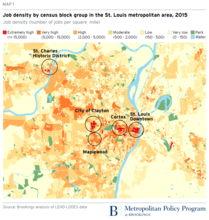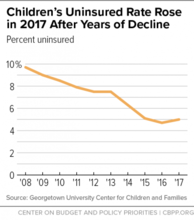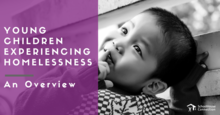Found 433 resources.
0
0
0

Using the story of Lily, a resilient, hopeful Muppet whose family is experiencing homelessness, Sesame Street developed a set of free, bilingual resources for children and families experiencing homelessness and the providers who serve them. Many different kinds of providers serve children experiencing homelessness, including school district homeless liaisons, early childhood programs, and homeless assistance and housing programs. To help these providers quickly and effectively leverage Sesame Street’s resources in the context of their specific work, SchoolHouse Connection has produced tip...
Topics: Child welfare, Education, Homelessness, Housing, Low-income
0
0
0
Activities and videos about homelessness for children and families
Topics: Education, Homelessness, Housing, Low-income
0
0
0

A mailer sent to low-income students with that promise led to a major jump in enrollment at the University of Michigan, according to a new study.
Topics: Education, Funding, Low-income, Post-secondary, Research, Youth
 Shared by Housing Is
on Dec 11, 2018
Shared by Housing Is
on Dec 11, 2018 0
0
0
As the Trump Administration continues to encourage states to take Medicaid coverage away from people who don’t meet a work requirement, a new report describes Montana’s promising alternative: a workforce promotion program that targets state resources toward reducing barriers to work.
Topics: Affordable Care Act, Asset building, Health, Legislation & Policy, Low-income, Medicaid / Medicare, Partnerships, Research, Workforce development
 Shared by Housing Is
on Dec 11, 2018
Shared by Housing Is
on Dec 11, 2018 0
0
0

As state and federal officials increasingly search for ways to curb rising health care costs, a decades-old idea is gaining traction: helping people with challenges that have nothing to do with medical care but everything to do with their health.
Topics: Cost effectiveness, Food insecurity, Health, Homelessness, Housing, Low-income, Medicaid / Medicare, Nutrition, Partnerships, Preventative care, Stability, Transportation
0
0
0
With collectively more than 100 years of policy expertise and values-based leadership between us, Ascend at the Aspen Institute and the Housing Opportunity and Services Together initiative at the Urban Institute partnered to develop a set of recommendations on how to harness assisted housing and public-private housing partnerships for better outcomes for families.
Topics: Dual-generation, Early childhood, Education, Family engagement, Health, Housing, Low-income, Place-based, Research, Stability
0
0
0
The 2018 Purpose Built Conference in Orlando, Florida from October 24 – 26 was a tremendous opportunity for thoughtful engagement and energetic conversations with Network Members and attendees from all across the country. Our panel of guest speakers represented a wide range of industries and brought unique perspectives and insights.
Topics: Community development, Education, Health, Housing, Low-income, Mobility, Partnerships, Place-based
0
0
0
People living just a few blocks apart may have vastly different opportunities to live a long life in part because of their neighborhood. Unfortunately, significant gaps in life expectancy at birth persist across many United States cities, towns, ZIP codes and neighborhoods. The latest estimates of life expectancy at birth reveals differences down to the census tract level. Explore how life expectancy in America compares with life expectancy in your area, and resources to help everyone have the opportunity to live a longer, healthier life.
Topics: Health, Housing, Low-income, Place-based, Research
0
0
0

In collaboration with Project for Public Spaces (PPS), the National Main Street Center (NMSC), and others, the Bass Center will examine the place needs of people and businesses and use that knowledge to help public, private, and civic sectors leaders develop new approaches to creating and supporting concentrations of economic activity that drive inclusive economic growth. The Center is premised on the idea that these “economic districts” represent the geographies in which leaders can have the most transformative impact—where they can build local trust and understanding, experiment safely,...
Topics: Community development, Low-income, Mobility, Partnerships, Place-based
0
0
0
Signs of digital distress: Mapping broadband availability and subscription in American neighborhoods
Broadband, especially wireline broadband in American homes, is the essential infrastructure for unlocking the internet’s economic benefits. However, broadband infrastructure is far from ubiquitous, both in terms of where it operates and who subscribes to it, and those deficits are not shared evenly across the country. As such, policymakers must understand how the national digital divide varies depending on the place.
Topics: Broadband, Education, Low-income, Mobility, Research
0
0
0
The city and county of Durham, GoTriangle and the Durham Housing Authority are committed to enhancing opportunities for existing low-income families as well as to increasing the production of affordable housing. The light-rail project is critical to the success of these goals, and the success of these goals is critical to the light-rail project.
Topics: Community development, Funding, Housing, Legislation & Policy, Low-income, Partnerships, South, Stability, Transportation
0
0
0

Despite their fearsome reputation, a new study finds most low-income housing projects aren't magnets for crime. What makes some more dangerous?
Topics: Housing, Low-income, Research, Safety
0
0
0

The uninsured rate among children rose in 2017 from 4.7 percent to 5 percent, a new report from Georgetown University’s Center for Children and Families finds — the first increase since Georgetown began producing this annual report a decade ago.
Topics: Affordable Care Act, Child welfare, Health, Low-income, Medicaid / Medicare, Research
0
0
0
The Department of Housing and Urban Development (HUD) is giving state and local housing agencies more funds to help them carry out a promising new policy to enable families with Housing Choice Vouchers to move to higher-opportunity neighborhoods. Agencies must apply by December 31 to receive the funds.
Topics: Child welfare, Funding, Housing, Legislation & Policy, Low-income, Mobility
0
0
0

Rock Region Metro has agreed to partner with a coalition of homeless organizations to address what people on the street say is their most vexing barrier to getting a job and, in turn, a home -- access to transportation.
Topics: Homelessness, Housing, Low-income, South, Transportation, Workforce development
0
0
0
Public housing residents are more likely than urban residents not living in public housing to have high rates of obesity and smoking and low rates of physical activity. This study assesses whether adding environmental interventions at public housing developments affects residents’ health-related habits and body mass index.
Topics: Exercise, Health, Housing, Low-income, Obesity, Research
0
0
0
Housing instability among families and children can be detrimental to child welfare, health, economic, and other outcomes. Policymakers and service providers in these fields should consider weaving housing into their approaches. Treating instability at its roots can relieve the trade-offs and stress that emerge when no decent housing is affordable. Evidence indicates that affordable housing can improve a range of outcomes for families and—in combination with short-term or long-term services—help providers tackle complex challenges head-on.
Topics: Child welfare, Family engagement, Housing, Low-income, Stability, Supportive housing
0
0
0

The Youth Risk Behavior Survey (YRBS) was first developed by the Centers for Disease Control and Prevention (CDC) in 1990 to assess the health risk behaviors of youth and adults in the United States. For the first time since the survey has been widely administered, the 2017 YRBS optional question list included two questions pertaining to homelessness. Using this YRBS data from 17 states (Alaska, Arkansas, California, Colorado, Delaware, Hawaii, Idaho, Illinois, Kansas, Kentucky, Maine, Montana, New Hampshire, North Carolina, Pennsylvania, Virginia, and Wisconsin), we conducted an analysis of...
Topics: Health, Homelessness, Housing, Low-income, Metrics, Research, Youth
0
0
0

This two-page fact sheet summarizes existing data on young children who are homeless and their families, including the impact of homelessness on health, development, early learning, and well-being.
Topics: Child welfare, Early childhood, Homelessness, Housing, Low-income
0
0
0
Each year, the National Summer Learning Association (NSLA) recognizes the outstanding work done during the summer months on behalf of our nation’s youth. NSLA held a Summer Learning Awards Kick-off Webinar to discuss the 2019 application and answer any questions you might have about the process. We were joined by Lauren Kellner Rudolph, Managing Program Director of Breakthrough Miami, and winner of a 2018 Excellence in Summer Learning Award.
Topics: Education, Low-income, Out-of-school time, Place-based, Youth
0
0
0
Most states use an education funding formula to allocate state and local dollars to school districts. Most funding formulas attempt to account for student poverty, among other factors, in distributing funds. But there are several ways to count low-income students and even more ways to tie dollars to these student counts.
Topics: Child welfare, Education, Legislation & Policy, Low-income, Place-based, Research, Stability, Youth
0
0
0
There were 33,889 homeless schoolchildren in Florida during the 2007–08 school year, including children temporarily doubled up with others and children staying in hotels, motels, shelters, transitional housing, and unsheltered locations. By the 2015–16 school year, that number had risen to 72,601. This report suggests that the rise is because of the recession and foreclosure crisis, the state’s increasing shortage of affordable housing, and school districts training teachers, counselors, and other staff to identify students with no permanent housing.
Topics: Data sharing, Education, Homelessness, Housing, Low-income, Research, South, Stability, Youth
0
0
0
More than a third of homeless people are part of a family, most of which are headed by women with at least one child. Homeless families are different from single homeless people, and their needs differ. But limited research focuses on these families. This study aims to fill the gap by exploring longitudinal health service use and expenditures for homeless family members before and after entering an emergency shelter.
Topics: Family engagement, Health, Homelessness, Housing, Low-income, Preventative care, Research, Stability
0
0
0

People with mental health disabilities are vastly overrepresented in the population of people who experience homelessness. Of the more than 550,000 people in America who experienced homelessness on a given night in 2017, 1 in 5 had a mental illness. The proportion of people experiencing chronic homelessness with mental health disabilities was even higher—nearly 1 in 3. Despite this fact, the reality is that most people with mental illness fortunately do not experience homelessness: While about 20 percent of all adults in the United States have a mental illness, less than two-tenths of 1...
Topics: Depression, Disabilities, Homelessness, Housing, Legislation & Policy, Low-income, Mental health, Partnerships, Preventative care, Stability, Substance abuse, Supportive housing
0
0
0
How should policymakers address the long-standing youth unemployment problem in Puerto Rico, which only worsened in the wake of Hurricanes Irma and Maria? After natural disasters, the government tends to focus its recovery efforts on infrastructure repairs and mental health services. But employment and economic security are equally important. With support from the W. T. Grant Foundation, MDRC partnered with Instituto del Desarrollo de la Juventud, or the Youth Development Institute, to develop recommendations that can create pathways into the workforce for young people and that are supported...
Topics: Low-income, Research, Workforce development, Youth
